September 22, 2024
Final event of the project Capacity Building – Branding – Fundraising As Key Leadership Stations Towards Successful Training Programme For Young Professionals
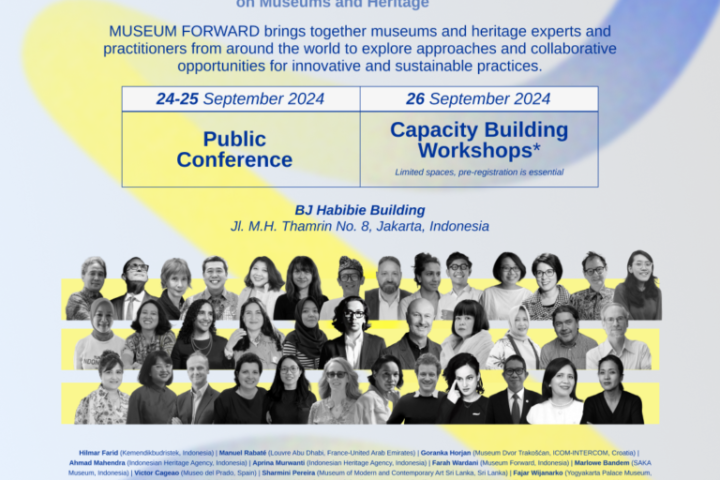
Final event of the project Capacity Building – Branding – Fundraising As Key Leadership Stations Towards Successful Training Programme For Young Professionals
MUSEUM FORWARD IN JAKARTA WILL HAVE A FOCUS HOW TO REIMAGINE MUSEUMS IN INDONESIA
ICOM’s international committees INTERCOM, MPR, ICTOP and ICOMON have partnered in the project Capacity Building – Branding – Fundraising As Key Leadership Stations Towards Successful Training Programme For Young Professionals in order to foster goals from the ICOM’s Strategic Plan related to capacity building of young professionals. This project is supported with the Special Project Grant from ICOM and host countries, Croatia and Indonesia. Today’s dynamic museum working environment requires knowledgeable, skillful and resilient professionals to serve their communities in better ways so partner commitees have developed a training based on practice examples to help future leaders to address and navigate new social, economic, environmental, and technological challenges. The forum Museum Forward International Best Practice Forum on Museum & Heritage is a unique opportunity for the museum community in Indonesia to benefit from the networking and collaboration with the ICOM’s international committees. Besides high-quality presentations and panels there is an elaborate training programme included in the Museum Forward Forum divided into different workshops organized by the Indonesian Hidden Heritage Creative Hub, ICOM and EUNIC Indonesia. Thus we have created a nice opportunity to focus on main issues of basic concern among museum leaders today. In particular the event will be a place to discuss transformative energy in museums in reimagining the new approach to fulfil its mission.
MUSEUM FORWARD, organised by the Indonesian Hidden Cultural Heritage Hub and EUNIC Indonesia, from 24-26 Sept. 2024, in Jakarta. Here, we would like to share with our members some of the takeaways and insights of an inspiring week filled with teachings and discussions.
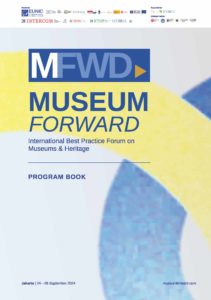 37 among speakers, panellists and workshop leaders to build a vision for Indonesian museums. From National delegates of the Ministries and of the National Heritage Agency, to International museum Directors, to create a platform for open dialogue, knowledge exchange, and the creation of meaningful connections expecially for the sake of young museum professionals.
37 among speakers, panellists and workshop leaders to build a vision for Indonesian museums. From National delegates of the Ministries and of the National Heritage Agency, to International museum Directors, to create a platform for open dialogue, knowledge exchange, and the creation of meaningful connections expecially for the sake of young museum professionals.
“Serving as a committee member for the Museum Forward was a rewarding and eye opening experience of the power of 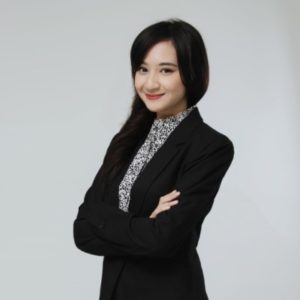 collaboration between institutions in shaping the future of museums. As a young museum professional from Indonesia, I had the opportunity to collaborate with the experts to shape meaningful discussions on the future of museums. Working closely with national and international partners provided an incredible opportunity to exchange knowledge, ideas, and best practices. This collaboration allowed us to foster dialogue on how museums can adapt and innovate, especially in Indonesia. Overall, it was a transformative chance to expand my knowledge, contributing to Indonesia’s museum landscape, and fostering cultural exchange.”
collaboration between institutions in shaping the future of museums. As a young museum professional from Indonesia, I had the opportunity to collaborate with the experts to shape meaningful discussions on the future of museums. Working closely with national and international partners provided an incredible opportunity to exchange knowledge, ideas, and best practices. This collaboration allowed us to foster dialogue on how museums can adapt and innovate, especially in Indonesia. Overall, it was a transformative chance to expand my knowledge, contributing to Indonesia’s museum landscape, and fostering cultural exchange.”
Karina Mintahir ,
Director Indonesia Young Museum Professional Forum
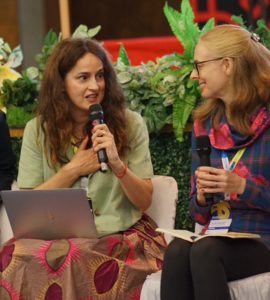 Interview to our rapporteur: Cecilia Martin – MPR
Interview to our rapporteur: Cecilia Martin – MPR
Ceclia Martin, joined the ICOM project group as MPR workshop leader and as rapporteur of the key Takeaways from MUSEUM FORWARD.
Cecilia, can you summarise the main topics of discussion during the conference?
C.M. – One of the most significant discussions centered around the need to give the audience a voice. To truly place museums in people’s hearts, we must engage with communities, listen to their insights, and involve them in the conversation. During the conference, we actively sought feedback from the audience to ensure their perspectives shaped our dialogue.
You spent some time also interviewing the participants. What came up from them? Why did they consider the conference relevant?
C.M. Here are some of the key insights shared by participants:
Museums as Platforms for Change: Museums should act as agents of positive societal change, engaging communities and addressing important social issues.
People at the Heart: Collaboration, storytelling, and inclusivity are crucial to building stronger connections between museums and their visitors.
Repatriation & Decolonization: Dr. Hilmar Farid highlighted the need for returning cultural treasures to their countries of origin, emphasizing the importance of local pride and cultural identity.
Collaboration & Inclusivity: Greater collaboration across institutions, diverse leadership, and the willingness to experiment are key to making museums more accessible and relevant.
Reimagining Museums: Museums must evolve into dynamic, participatory spaces that engage younger audiences and address contemporary challenges.
Audience Empowerment: Visitors should be seen as co-creators, actively participating in shaping museum programming and dialogues.
Leadership & Adaptation: Museums need flexible leadership models to stay relevant and impactful in an ever-changing world.
Decolonization & Transformation: Museums should embrace new narratives, uncovering hidden histories and elevating diverse voices.
Visibility & Connection: Museums must connect with contemporary culture and make their collections and programs an integral part of people’s daily lives.
Sustainability & Flexibility: Financial and operational sustainability are crucial for adapting to future challenges and ensuring the longevity of museums.
What did this conference mean for you?
Our time in Jakarta was both inspiring and thought-provoking. The discussions and museum visits made it clear that reimagining museums for future generations is not just a task—it is an urgent need. Tetap semangat! (Keep up the spirit!)
Museum visits in Jakarta
Our first day in Jakarta was dedicated to visiting some of the city’s museums, which gave us deeper insight into the current state of cultural institutions in the region.
Jakarta, home to over 12 million people, faces many challenges typical of a megacity. As the government begins shifting its capital functions to Nusantara, on the island of Borneo, Jakarta must now reposition itself as a major tourist destination. This transition, however, is complicated by the city’s sinking situation—a problem as severe as Venice’s—making international collaboration, particularly with Italian conservation experts, vital.
However, the goal of our being there was not to provide ready-made external solutions but to offer ideas that could be adapted, internalized, and made truly Indonesian.
The hope is that the participants left the conference not only informed but inspired to shape their future in a way that reflects their unique cultural heritage and values, updated to the worldwide museums trends.from the Dutch colonial period, offering a glimpse into the era’s impact on Indonesia.
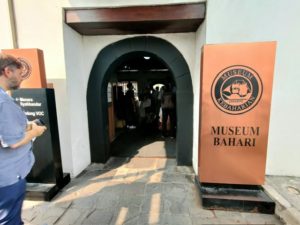
The Bahari Museum: This maritime museum, housed in a historic Dutch East India Company warehouse, showcased the country’s rich maritime history. The collection of old ships and artifacts painted a vivid picture of Indonesia’s long-standing connection to the sea.
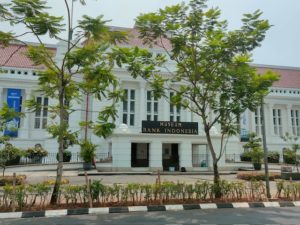
Museum Bank Indonesia: Set in a grand colonial building, this museum presented Indonesia’s financial history in a visually captivating way. The exhibits highlighted the role of banking in shaping Indonesia’s economy and cultural development.
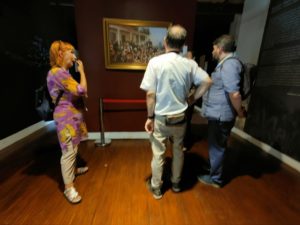
Jakarta History Museum:Located in the heart of the old town, this museum gave us a comprehensive look at Jakarta’s journey through the centuries. From colonial artifacts to interactive exhibits, the museum highlighted the city’s dynamic history.
In between the scheduled tours, we managed to visit other fascinating museums, squeezing them into the limited gaps in our program. These institutions collectively gave us a strong understanding of the diverse cultural heritage preserved in Jakarta’s museums and the challenges they face, including the need for modernization, increased community engagement, and sustainable practices.
We couldn’t visit the National Museum, which will reopen in a few days after an extensive renovation following a devastating fire and to which we address our best wishes.
The reopening is highly anticipated, as it will mark a new chapter for the museum, which has long been a cornerstone of Indonesia’s cultural landscape. The renovated National Museum promises to offer a more immersive and informative journey through the nation’s history, reaffirming its status as a cultural treasure.
The National Museum of Indonesia, located in Jakarta, is one of the country’s most significant cultural institutions. Known as Museum Gajah due to the bronze elephant statue in front of the building, it houses a vast collection that reflects Indonesia’s rich history, diverse cultures, and unique heritage. With artifacts spanning prehistoric times to modern-day, the museum serves as a window into the nation’s cultural evolution.
Following the fire that tragically damaged part of the building, the museum has undergone extensive renovations to not only restore but enhance the visitor experience. The renovations include improved exhibition spaces, updated security and preservation measures, and interactive technology to better engage visitors with the museum’s contents.
Among the museum’s treasures are:
- Ancient Hindu-Buddhist sculptures: These include stone carvings and statues from Java and Sumatra, reflecting the influence of Indian civilization on early Indonesian culture.
- Ethnographic collections: These include traditional clothing, musical instruments, and household items from across the archipelago, showcasing Indonesia’s cultural diversity.
- Gold and jewelry collections: Dating from the 7th to 10th centuries, these include ornate gold pieces from ancient Indonesian kingdoms.
- Prehistoric artifacts: Tools, pottery, and fossil remains offer insights into the lives of early inhabitants of the Indonesian islands.
Colonial history exhibits: The museum’s collection includes artifacts
Videos of the conference and registrations of the interventions can be found clicking on the buttons here:
https://drive.google.com/file/d/1UsukxIaXQTKWcGkXGX3LIoY6TfzHAbzJ/view